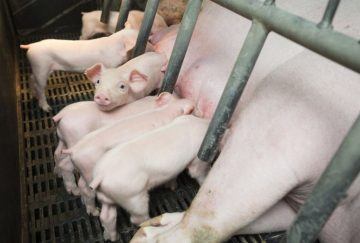Troy Vettese in the Boston Review:
 “Never look a hog in the eyes,” an experienced hand told anthropologist Alex Blanchette as they prepared to artificially inseminate sows. “If the animals think you are looking at them, they will freeze.” Like a living, inverted panopticon, hundreds of pigs would watch their handlers from their pens with a petrifying gaze. “They have almost 360 degrees vision,” a former worker recollected. “Sometimes they look like they are not looking at you. . . . but if you look at their eyes, you will see that they are always following you.”
“Never look a hog in the eyes,” an experienced hand told anthropologist Alex Blanchette as they prepared to artificially inseminate sows. “If the animals think you are looking at them, they will freeze.” Like a living, inverted panopticon, hundreds of pigs would watch their handlers from their pens with a petrifying gaze. “They have almost 360 degrees vision,” a former worker recollected. “Sometimes they look like they are not looking at you. . . . but if you look at their eyes, you will see that they are always following you.”
Blanchette’s new ethnographic study of modern factory farming, Porkopolis: American Animality, Standardized Life, and the Factory Farm, is in many ways a meditation on seeing—or what we fail to see. Often we struggle to detect the meat industry’s traces, be they fecal particles suspended in the air or the porcine pathogens that suffuse the environs of “concentrated feeding animal operations” (CAFOs), where thousands of animals are kept indoors for long periods to speed up production. CAFOs made up only a small share of farms as late as the 1970s but now produce the vast majority of America’s meat, eggs, and milk. Blanchette stresses that the factory farm he studied didn’t just make pork; it also produced the ingredients for gel-covered pills, yellow fizzy drinks, cosmetics, and computers.
More here.
